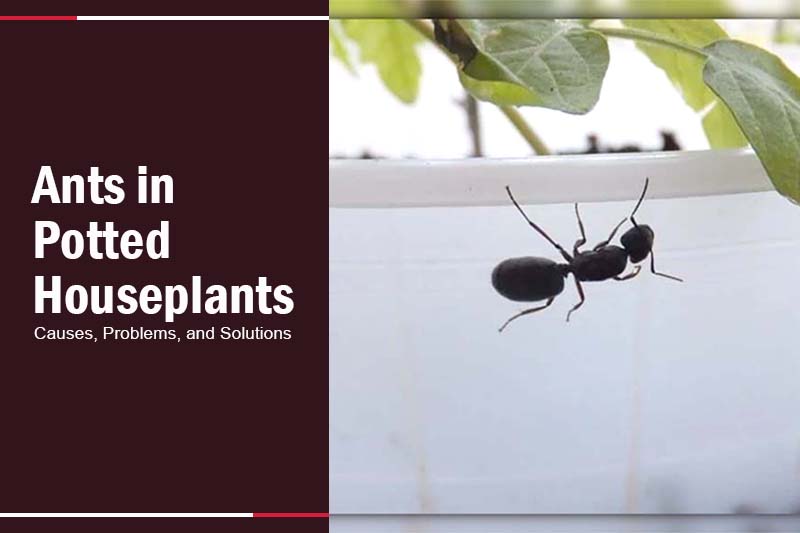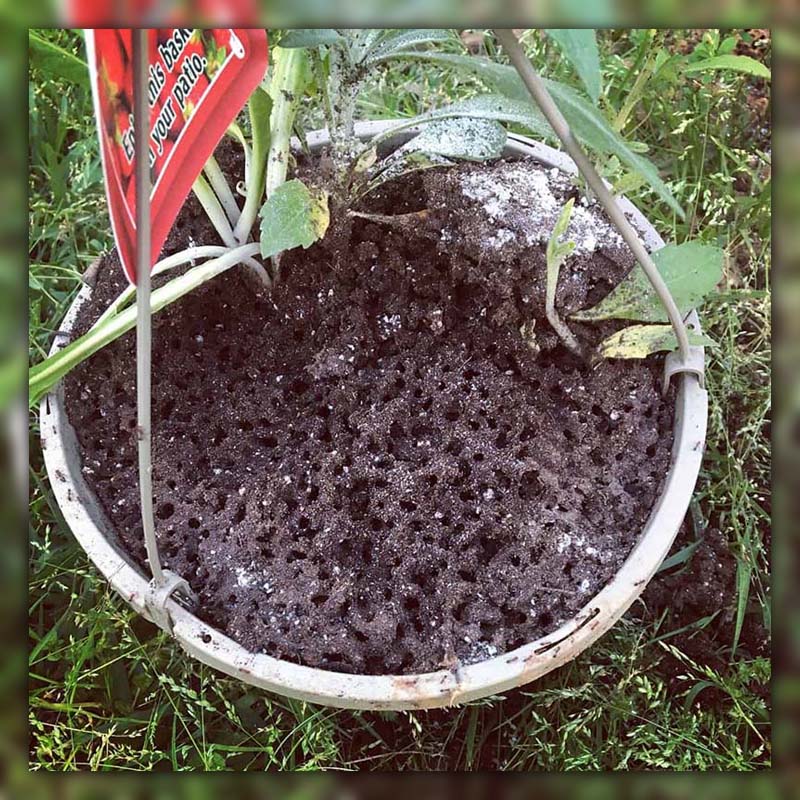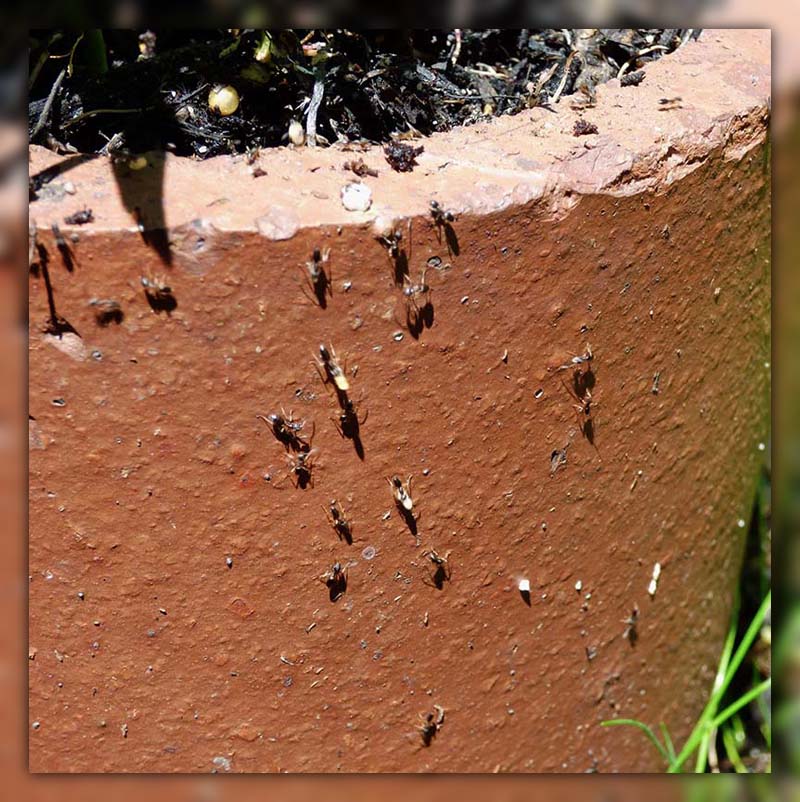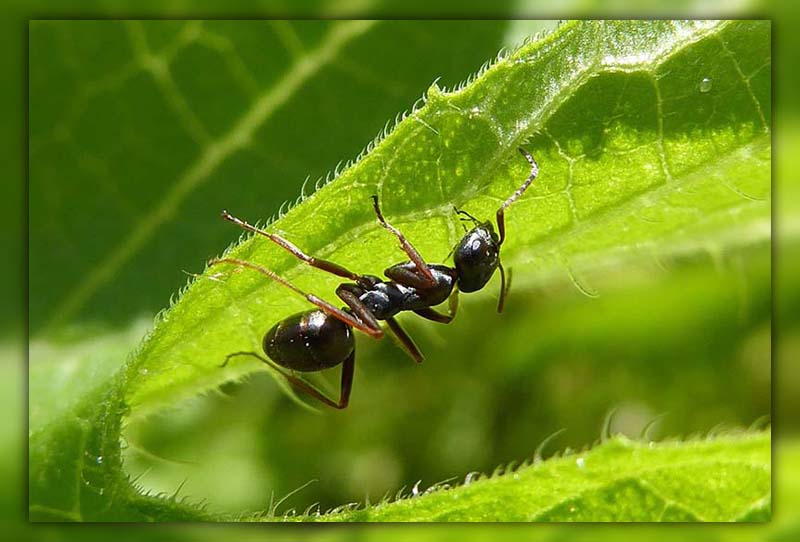Do you wonder how the ants got there and what they are doing to your plants?
In this article, you will learn the reasons why ants in potted plants, the damage they can cause, and the best ways to get rid of them.

How to get rid of Ants in Potted Plants?
Ants may be beneficial to the ecosystem, but when they make their home in your potted plants, it can be quite bothersome. Fortunately, several techniques can help you get rid of these pesky critters.
Mix Essential Oil and Cinnamon Powder
Ants don’t like strong scents, making essential oils and cinnamon powder a great combo to deter them. To use this method, simply mix a few drops of essential oil (like peppermint, tea tree, or citrus) with cinnamon powder.
Sprinkle this mixture around your potted plants. The strong aroma will confuse the ants’ scent trails, discouraging them from visiting your plants.
Spread Diatomaceous Earth
Diatomaceous earth is a natural powder made from tiny fossilized aquatic organisms. Its microscopic sharp edges can cut through the ants’ exoskeletons, causing them to dehydrate and die. Lightly sprinkle it around your plants and any areas where you notice ants.
Use insecticides (as a last resort)
Insecticides can be effective but should only be used as a last resort because they can harm beneficial insects and may have negative effects on the environment.
If you choose to use insecticides, make sure they are specifically designed to treat ants and follow the instructions on the label carefully.
Spray orange oil or homemade ant repellent
Orange oil contains d-Limonene, which can kill ants by breaking down their exoskeletons. Mix a tablespoon of orange oil with a pint of water and spray it directly on the ants.
Alternatively, you can make a homemade ant repellent by combining equal parts of vinegar and water and adding a few drops of dish soap. Spray this solution around the potted plants.
Use White Vinegar
White vinegar is an excellent natural ant deterrent. It confuses their sense of smell and disrupts the scent trails they use to navigate. Create a 50/50 mixture of white vinegar and water and spray it around your potted plants and any ant trails you see.
Use Essential oils
Certain essential oils can deter ants. Peppermint, for example, disrupts their scent trails. Tea tree oil can deter ants and other pests. Lemongrass oil can even kill them. Mix a few drops of your chosen oil with water and spray it around your plants.
Soak the soil
Another method to rid your potted plants of ants is to thoroughly soak the soil with water. Ants dislike overly wet conditions, and this can force them to leave. Just be sure not to overdo it as overwatering can harm your plants.
Use Borax
Borax works as a slow-acting poison for ants. Mix it with sugar to attract the ants, who will then carry it back to their colony. In a few days, it should kill off the colony. However, be cautious as borax can be harmful to pets and children.
Use Ant Bait
Ant baits contain a food source mixed with a slow-acting poison that the worker ants carry back to the colony, effectively killing it. However, be patient as this method can take a few days to a week to fully work.
Replace the soil
If all else fails, consider replacing the soil in your potted plants. This will remove any ant colonies nesting in the soil and can help get rid of any insect eggs or larvae that might be present.
Why are Ants attracted to potted plants?
Ants can frequently be found in the company of potted plants. There are several reasons for this attraction that range from the search for food, the need for a nurturing environment for their young, and a desire for a safe shelter.
The following factors provide an insight into these reasons.
Plants provide a source of food
Ants, much like other creatures, need sustenance to survive. Potted plants, particularly those infested by insects such as aphids, caterpillars, and mealybugs, offer a rich source of food for ants.
These insects excrete a substance called honeydew, which is high in sugar content. Ants are attracted to this sweet substance and will go to great lengths to get it. They will also feed directly on the plants’ sap, nectar, and even pollen.
Furthermore, some ants are attracted to certain types of fungi that can be found in the soil of potted plants, which they also consume. Potted plants, therefore, serve as an excellent source of food for ants, which is one of the main reasons they are attracted to them.
The soil in the pot provides a suitable environment for nurturing young ones
Potted plants, especially those with loose, well-draining soil, provide an excellent environment for ants to breed and nurture their young. The soil in potted plants tends to be warm, moist, and rich in nutrients – conditions that are perfect for ants to lay their eggs and raise their young.
In some cases, the ants may even transport food and other materials back to their nests in the soil of the pot, to ensure their young have everything they need to grow and thrive. This is another reason why ants are often attracted to potted plants.
Provide a safe shelter
Ants are always in search of a safe and secure shelter to build their nests, and the soil of a potted plant offers just that. The soil in a potted plant is often loose and easy for ants to dig through, making it an ideal place for them to establish their colony.
Besides providing a suitable environment for the ants to live and breed, the pots also offer protection from predators and harsh weather conditions. The pots’ enclosed nature gives ants a sense of security and safety, which is crucial for their survival.
Fragrance in the pot
Certain types of plants emit fragrances that are appealing to ants. These fragrances are often a result of the plant’s natural defense mechanisms, intended to attract beneficial insects that can help in pollination or ward off harmful pests. However, these fragrances can also draw in ants.
For instance, certain plants may emit sweet, sugary scents that can attract sugar-feeding ants. Other plants might produce fragrances that mimic the pheromones of ants, tricking them into thinking that there is food or a suitable nesting site nearby.
Best Ways to Prevent Ant Infestations
Prevention is always better than a cure. As such, taking proactive measures to keep ants at bay before they infest your potted plants is the best course of action. Here are a few strategies to keep in mind
Place the Plant Pot on a Water Tray
One effective way to prevent ants from invading your potted plants is to place the pots on water trays. Ants are not adept swimmers, and a water tray serves as a moat that deters them from crossing over to the plant. Just ensure the water level is maintained.
Use Pot Feet, Risers, or Stands to Elevate the Plant Pot
By elevating your plant pots with feet, risers, or stands, you make it more difficult for ants to reach the plants. This simple technique not only helps prevent ant infestations but also promotes better drainage and air circulation for the plants.
Use Fewer Organic Materials
While organic materials like compost or manure are great for nourishing plants, they also attract ants and other insects. To reduce the likelihood of an ant invasion, try to limit the use of these materials or consider using organic material alternatives that are less attractive to ants.
FAQs
In this section, we answer some of the most frequently asked questions about ants and their relationship with potted plants.
Do Ants eat plant roots?
While ants are omnivores, most species don’t typically eat plant roots. They are more attracted to the sweet excretions of other pests, like aphids or mealybugs. However, their digging can disturb the roots and affect plant health.
Do ants harm plants in pots?
Generally, ants are not directly harmful to plants. They can help aerate the soil, which benefits plant roots. But when they build large colonies, they can disturb the roots and the stability of the plant. Furthermore, as ants farm pests like aphids for their sweet secretions, they can indirectly contribute to an infestation that damages your plant.
Conclusion
Ants in potted plants can be a nuisance. You can use various methods to repel, kill, or prevent them.
Whatever method you choose, make sure to keep your potted houseplants clean and healthy. We hope you found this blog post helpful and informative. For more pest control tips and tricks, visit our website at Pestweek.

Calina Mabel has over 15 years of experience in the field of journalism and communications. Currently, Calina Mabel is the Content Writer for categories such as Cockroach, Ants, Bed Bugs, Mosquito, Rodent, Termite, and Flies on Pestweek.com. She aims to build content for these categories with a focus on providing valuable and accessible information to readers, in order to create the world’s largest knowledge community about Pests.
All content written by Calina Mabel has been reviewed by Emily Carter.




